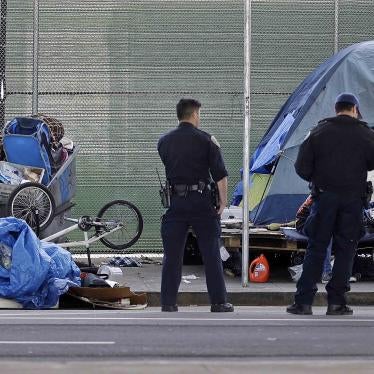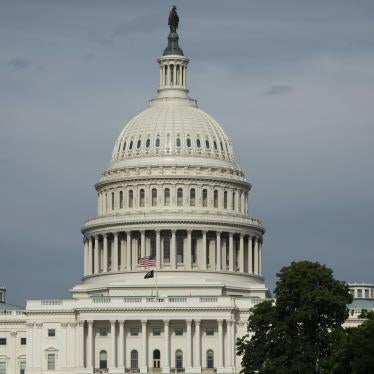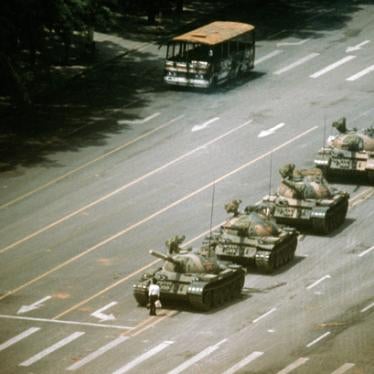
閱讀這支影片的文字描述
[Text]
Over 75,000 people are without housing in the county of Los Angeles.
The city has authorized LA Sanitation to conduct systematic clearings of unhoused encampments, enforced by the Los Angeles Police Department.
The operations are known as 'sweeps.'
Numbers of unsheltered residents continue to increase as wages fall far behind the cost of housing.
Six unhoused people die every day in LA County.
swept
part one
[We see a small encampment next to a canal.]
MICHELLE: They woke us up this morning telling us that they're going to do a clean sweep, and that to grab what we can, and to get out. Because they were taking everything else.
They take our food. They took all my underclothes. They took all my shoes. They leave us with no resources. So we're stuck here until we can manage to get something to eat or clean water or whatever it is, because they don't care.
I've been here four years on the river, and they've done this to us three times already.
Everybody gets to arguing.
Everybody gets to fighting.
Your relationship falls apart.
Your family falls apart.
I was a manager of a laundromat. The minute Covid hit the owner he was gone. Took all the money from all the machines. He left me there with nothing. I lost my job, I lost my house. It's mainly me, my family. My son, my boyfriend, my friend.
This is our home right here. Because we're together. I feel like I'm the mom. Everybody comes to me, like, "What are we going to do? What are we going to do?" I don't know anymore.
If we don’t stick together... we won’t make it.
PETE WHITE, Los Angeles Community Action Network: Over the last decade here in Los Angeles, houselessness has exploded.
The city has made the choice to use criminalization and sweeps as the answer to houselessness.
Criminalization, in the most simple sense, is the use of laws and policies and regulation to arrest, displace and banish poor people
from places that government does not want to see them.
BECKY DENNISON, Venice Community Housing: I cannot answer the question as to why Los Angeles, or any other locality would still be using a criminalization model. It clearly does not work.
Los Angeles has the most unhoused people and for many, many years was using the most punitive criminalization measures.
And then if you put the institutional racism on top of that, Black folks are something like seven or eight times overrepresented in the unhoused community.
[Several police officers and city workers are seen conducting a sweep.]
MAN: They can’t throw my family heirloom away!
PETE WHITE, voiceover: Most people, when they hear the word "sweeps," they think like sweeping the sidewalks is a great thing. But sweeping an encampment, this entails scores of police. Heavy industrial equipment.
Where else in the world would one use a bulldozer to remove a camping tent?
[Person with megaphone]: People are going to be sitting on the side of the curb, trying to figure out how they're gonna get the money to buy a stick of deodorant. This is very violent.
You have a man who has a whole mechanic shop out here. And you guys just bulldoze people’s stuff away, like it don’t mean nothing.
[A person carries a ladder away from police.]
He wants his ladder. He wants his ladder, man.
PETE WHITE, voiceover: Once we actually understand the purposes of a sweep, and that purpose is not to help get the individual into housing, then we understand that there's something really broken with this system.
[pause]
[A man examines the contents of a box outside.]
HARVEY: Want some Narcan? Joanna brought me a whole box again, and it’s good until 2026. That's good.
I'm not a drug addict. I don't want to do it. But then again, I can't turn my back.
That's one thing I will never do, is turn my back on somebody who needs stuff like this.
I've been doing it for the 24, next month will be 25 years that I've been living out here.
Now we have to move.
[We see a flier taped to a utility pole with the title "NOTICE MAJOR CLEA" and a date and time.]
I get it that they want to fix this up, and that's why we have to leave. But we're not gonna be able to come back.
Shouldn’t have had all this stuff.
They’re gonna fence it. They're gonna put a fence here so that nobody can come in here to stay.
We are a community. When you see a group of homeless people, that's community.
[Standing in a tent encampment as people pack belongings into a truck, Harvey hugs a woman.]
HARVEY: Thank you for coming.
HARVEY, voiceover: They're all set up near each other, that's community. But see, they don't see it that way. They don’t see that we actually can protect each other.
I became homeless after I lost my house due to a fire.
I was on the freeway, I was moving in, I was coming over here to LA.
All of a sudden, I started getting tunnel vision.
And I went to the doctor and I was shaking, really shaking so much that he just stood there looking at me, and he knew that it was the Parkinson's.
I can feel that it wants to act up. I'm not young anymore, so I really wish I had my own place, that would help me with not only getting off the streets, but it would also help me with my medical problems.
If I start to shake at least it’ll be in private. Not in a tent.
[pause]
[Two women walk across a street. One of them is pulling a wagon full of paper bags.]
SONJA: So we do a lot of outreach at the Grand.
We haven't done around the building yet, so that's why we were talking. Because there's a lot of unhoused people right here.
People get lost. Like when they look at somebody that's unhoused. They just see this, like, drug-addicted, damaged person.
They don't ever look at someone like, oh, they have a family.
That's some down there? Yeah. Down there.
[Sonja and her companion are talking with a man next to a tent.]
MAN: How much is it?
SONJA: It’s free.
MAN: I’ll take it.
SONJA, voiceover: Pretty much most of Los Angeles is a paycheck away from being unhoused.
You could lose your job, lose a spouse, have something maybe traumatic happen and maybe lose your mind for a moment.
It could happen to anybody. I've met lawyers. I have a friend who used to be a nurse. It's the worst feeling in the world to have somebody walk by you like you're not even there.
[Sonja walks by a broken fence along a street.]
So yeah, we used to stay right here, like along this fence.
So you can tell where mine is, see where the cutout is? That hole right there?
[laughing] We had that hole!
I lived right there for the majority of the time that I was unhoused. Close to seven years.
Every Tuesday, all of that area would get swept.
It would be like half the police for was out there. Like are you kidding me?
The minute eight o'clock would hit, they would throw up the tape. And if you didn't have one thing, you lost it. They didn’t care. They would throw your s**t away, and not even think twice about it.
[Images of black & white photos.]
I had a lot of personal family photos. Things from my dad who passed away, and they got swept.
It was like super demeaning, you know?
And, you know, I sat in that space for a really long time when I was unhoused.
Like I was undeserving of doing better.
PETE WHITE: So of course the effects of criminalization on houseless people, it's a horrible disruption.
GENERAL DOGON, Human Rights Organizer, LACAN: They start off. They don't come and just unzip your tent and walk in. No. They start off with a razor blade. And slice your tent down the middle, killing your tent right there. It ain't no good no more.
GISELLE HARRELL, Resident and Organizer, Aetna Street: So they're there to specifically take our personal belongings and throw it away.
So I'm like, it's not a cleanup.
GENERAL: They took this woman's urn of her mother’s ashes. And I mean, the screams that woman would yell, was like somebody was taking her baby away from her.
[A man with a face mask carries a meowing kitten.]
RONALD PAUL HAMS, Resident and Organizer, Aetna Street: Just last week, I lost everything from personal belongings, to electronic devices... I.D., everything, so you know, I have to start over, pretty much all over again.
GISELLE: And it's a traumatic event. Like every week. Every week we have to go through this.
RONALD: I went overseas and I fought for my country and watched a couple people die for theirs.
I can't even walk on it or live on it or lay on it?
That's a slap in the face.
SONJA: When you're on the street, you feel like completely isolated. Even though you're around a billion people. You're, like, alone in your head.
Makes it very hard to get your feet back on the ground, and that f***s with your head after a while.
I don’t know. It’s like really, really cruel.
[pause]
[Text]
part two
[Michelle, from part one, walks toward a bag checkpoint.]
MICHELLE: I got lucky because I network and network and network, and I was the lucky one that they had one space for a woman.
And I got a Chinatown container home.
The sadness from not having a place went away.
And then I became sadder because I'm by myself.
[Michelle takes a seat on a city train.]
MICHELLE: I do this every day.
Because I could be in my little room, with my heater and air conditioning.
But what's the point of that, if my heart is right here with my family and friends?
They should have took us all together.
[Michelle walks into a tent encampment.]
WOMAN, with dog: She just ate a whole bowl of food!
MICHELLE: It's my son, my boyfriend, my friend, my daughter-in-law. They're all out here still. I'm not leaving them like that.
I’m the mom.
Since we can't afford to buy clothes all the time. So we sew everybody’s holes!
Like hoodies, jackets...
What would I like?
I would like everybody to get off the streets, into some kind of housing, and not have to be like this.
[Michelle is back on the city train.]
MICHELLE: It's not right.
So I go home, I come back. I go home...
I’m the mom.
I have to come back.
[pause]
[Harvey, from part one, is walking along the street.]
HARVEY: What are you guys up to?
They’re chasing us out of here.
They’re going to take us on a bus. Three of us, with our stuff to the motel.
I couldn't sleep last night.
I was thinking about what's happening today because I have to get rid of stuff and you can only take so much.
We'll give you 60 gallon bags, two.
Whatever you fit in that, is what you can take to the room.
BECKY DENNISON, voiceover: Emergency housing is really, really expensive. The one that's the most unsustainable is the use of motel rooms.
Paying $140, $180 per night. We're talking thousands of dollars per person to live in these motel rooms. And it is absolutely not sustainable.
It comes at the expense of people's lives and at the expense of permanent housing options that could have been invested in with that same amount of funding.
So if it really was, you know, 60, 90 days and then they’d be moving on, you know, that could work.
But that's not the way it happens, because we have no place for people to go.
[Harvey smokes a cigarette outside a motel at night.]
HARVEY: It feels isolated.
I feel like I'm very isolated here because, you know, the rules are that you can't go visit your friends. The ones that came with me over here, that I convinced to come over here.
They even make you sign a form saying that you promised that you wouldn’t be going to room to room.
[interviewer]: And they're in the same hotel right?
HARVEY: Yeah, they're above me.
To me it’s more a prison.
It's more of a prison. But with a revolving door that we can come out here and get fresh air or whatever.
I wish I could get somehow the right help.
That would help me find a place cheap enough for me to afford, that I'll be able to live there at peace on a permanent basis.
[pause]
[People are holding signs and chanting outside.]
[person with megaphone]: Housing is a human right!
[crowd]: Fight! Fight! Fight!
SONJA, voiceover: I could never do the work I do if I wasn't in housing.
[Sonja walks a dog into a house.]
I was on the street for about six plus years, and I finally got my housing voucher.
I have a great landlord, who has already worked with Section 8, and helped me get in here.
They take 30% of whatever income you get. So if you get no income, then you don't pay anything.
When I first moved in, I wasn't full time working yet.
My rent was $10 a month.
And now I’m paying like $1200, and they pay the difference.
[We see the inside of Sonja's full walk-in closet.]
I've always had a 'shoe thing.' But now I have a bigger ‘shoe thing.’
When I got into my own place, it was like, ‘Oh my God I’m me again.’
You know, it was huge.
I got offered the job like two months into getting my housing.
[Framed photos are hanging on the wall.]
Now being inside, every time I see my mom she sends a box of pictures.
And gives me a lot of old photos, you know, those black and white ones of family.
And so I decided to litter my walls with them.
When I first came here, I secluded for the longest time because I was just, like, soaking it all up.
It was huge, to like, not have to worry about your stuff getting stolen. Or if you can go to sleep or not, if you're going to be safe.
[Sonja swipes down a phone screen.]
My calendar is nuts. That's what my calendar looks like.
It just made me fight even harder to, like, keep my job and make sure that I don't lose it.
BECKY DENNISON: Permanent housing. It is the only solution to homelessness, both for individuals and for our region.
PETE WHITE: The solutions are right at our fingertips, but the political will does not exist.
BECKY: Because it's about the appearance versus the solution.
PETE: If we had real budget hawks you would say: Those strategies that push people everywhere are actually more expensive.
BECKY: Every piece of research will show you that permanent supportive housing is really, really effective.
PETE: The only way that this is fixed is that we're building housing in every community.
BECKY: That's the investment that any industrialized, wealthy country besides the United States has made.
And we need to make it.
[Sonja stands at a podium in front of people.]
SONJA: Hi, my name is Sonja Verdugo, and I'm an organizer.
SONJA, voiceover: My work means everything to me.
I could never maintain my job right now, if I was on the street. There’s no way.
It's probably the most fulfilling thing I’ve ever done.
I feel like I’m part of the push to make the difference somewhere down the road.
It's gotta start somewhere.
And I think the people in LA are tired.
Of seeing how things are.
And they're ready to fight.
[pause]
[Text]
In June 2024, the US Supreme Court issued a ruling that further enables cities to use criminalization as their primary response to houselessness, even when people have no place else to go.
Research and experience point to a better approach.
Creating permanent, affordable housing, with supportive services for those who need it, is the proven way to end houselessness.
Tell your representatives to end criminalization and prioritize housing as the solution.
- 洛杉磯有計劃地將失去住房者視同罪犯,以其失去住房狀況導致的違規為由加以逮捕傳喚,並透過公共衛生掃蕩行動摧毀他們的財物。
- 罪犯化措施把失去住房者趕出公共空間,但從未設法解決他們缺乏住房的問題。
- 市政府應停止罪犯化和破壞性的衛生掃蕩措施,轉而將資源投入維護並提供人人可負擔的住房和人們實際需要的服務。
(洛杉磯)-人權觀察在今天發布的報告中表示,洛杉磯市政府實行殘酷無情、成本高昂且毫無實效的政策,透過逮捕、罰款和摧毀財物等方式,將民眾失去住房(unhoused)的狀況視同犯罪行為。美國最高法院於2024年6月28日作出判決,即便在可用收容所不足的情況下,執行這種將失去住房者視同罪犯的法律仍屬合憲。加州州長紐森(Gavin Newsom)隨即要求各行政區摧毀失去住房者的紥營處,恐將導致洛杉磯和全州、全國各地擴大實施這種措施。
這份337頁的報告《「你們必須搬走!」:洛杉磯以殘忍且無效政策將失去住房者視同罪犯》記錄在洛杉磯街頭、車輛、臨時收容所和公園居住的人們的遭遇,他們一邊掙扎求生,一邊被政府視為罪犯而非優先防止迫遷或提供永久住房。執法和衛生機關的「掃蕩」行動將失去住房者趕出公眾視野,經常將資源浪費在無法解決根本需求的臨時收容所和處罰措施。數萬人居住在洛杉磯街頭;失去住房者的死亡率直線上升。
The Cruel and Ineffective Criminalization of Unhoused People in Los Angeles
「只因最高法院允許採行一種適得其反的不良策略,不表示洛杉磯就該加以實施,」人權觀察美國專案副主任約翰・拉夫林(John Raphling)說。「解決無住屋問題的行之有效方法不是把人抓走、把他們的東西扔掉,而是讓人們保有自己的住房,同時新建與維護更多可負擔的永久住房。」
從2021年8月直到2024年5月,人權觀察研究洛杉磯無住屋問題,包括住房政策及措施的歷史,訪談約150名專家——其中逾100人曾有無住屋經驗——並分析洛杉磯警察局、衛生局和其他相關政府機構的數據。
失去住房的居民談到被開罰單和逮捕的經驗,罪名皆因貧窮而起,包括違反洛杉磯市政法典第41.18條,即禁止在指定公共場所坐臥,以及第56.11條,即禁止在公共場所堆放個人財物。受訪者談到他們因此坐牢,還被裁處超過他們整個月收入的罰款。
洛杉磯警察局數據顯示,幾乎所有輕度違規的執法對象都是失去住房者,例如在公共場所飲酒、亂丢廢棄物和闖越馬路。從2016年直到2022年,全市所有逮捕和傳喚(包括重罪、輕罪和違規)近百分之40是針對失去住房者,而他們僅佔全市人口的百分之1。
幾乎每一位接受訪問的失去住房者都談到衛生局掃蕩把他們的隨身財物清除銷毀,而且幾乎總是有警察在場威脅逮捕抗拒者。被清除的財物包括提供舒適和抵禦天候影響的物品,例如:帳篷、座椅、寢具和衣物;身分證明、藥品、法庭文件、現金和其他生存必需品;以及家人照片、信件、傳家寶、甚至親人骨灰。人權觀察見證了這些掃蕩行動的粗暴,並描述其後果。
人權觀察發現,儘管收容所和臨時住房(包括暫時寄宿旅店房間)有助緩解街頭生活的不適,但它們都無法提供獲得永久住房的可靠途徑。收容所的條件不一,從略感舒適到不宜人居都有。收容所限制居民獨立性,通常實施宵禁、搜身和禁止訪客等有辱人格的規則,令許多人感覺如同坐牢。很大一部分人出於挫折感或停留時間屆滿而離開臨時住房,然後再次回到街頭。
市政決策單位利用稀少的臨時住房來合理化將失去住房者視同罪犯並加以掃蕩的做法,聲稱相關措施旨在將他們安置於「住房」中,以撇清手段殘忍的指責。掃蕩行動通常將人們從引人注目的紥營區清除到旅店和收容所,至於較不顯眼的區域就只是把人們驅趕到街頭上其他地點。人權觀察指出,洛杉磯無家可歸者服務管理局(Los Angeles Homeless Services Authority)竟也參與這些掃蕩行動,不僅有違其所宣告的價值觀和最佳實踐,也使該局更難建立為民眾提供援助所必須的信任感。
市長巴斯以解決無住屋問題為主要政見,並為此努力引進更多資源。然而,她最具特色的「屋內安居」(Inside Safe)計劃的做法是掃蕩街頭營帳、將居民遷入旅店房間,不但成本高昂難以為繼,相關支持服務不一致且不足夠,更因缺乏永久住房供人遷入而窒礙難行。此外,由於最高峰只有1,500個房間,「屋內安居」計劃即便只提供暫時收容也沒有能力服務洛杉磯全市35,000多名街頭露宿者。
人權觀察發現,在歷史上和現行的各項種族歧視政策與措施——包括限制條款、劃紅線拒貸、單戶獨棟區、治安警務和學校及醫療保健經費縮減——匯合之下,洛杉磯的無住屋問題在黑人當中急遽惡化。黑人佔該市人口不到百分之8,卻佔無屋者的三分之一以上。
人權觀察指出,無住屋問題是有系統的住房危機之一環。洛杉磯在居民所得用於住房比例過高以及人口過度密集方面領先全美。研究顯示,該市可負擔住房短缺高達50萬個單元。這些情況代表該市很大一部分人口面臨迫切風險,隨時可能失去住房、流落街頭而被視為罪犯。
雖然導致流落街頭的情況因人而異,但在市場經濟鼓勵開發昂貴住房以及政府未確保人人獲得永久住房的背景下,正是可負擔住房的整體短缺導致了大規模的無住屋問題。
國際人權法維護人人享有住房權,包括具備適宜居住、使用權受保障且易於取得以及其他不同於收容所性質的住房。人權觀察發現,美國各級政府均未能投入適足資源以實現這項權利。受訪專家們幾乎一致認為,唯有建造、維護並使人們保有永久住房才是解決之道。人權觀察在這份報告中描述了成功的住房計劃,以及一些流落街頭後重獲住房者的正向經驗。
「將失去住房者視同罪犯可以逼使他們隱身於公眾視線之外,但這樣只會讓情況更加惡化,」拉夫林說。「我們知道,唯有讓人們遷入住房,或讓他們繼續保有住房,才能終結無住屋現象。我們必須停止對人們落井下石,全力協助他們獲得住房。」








